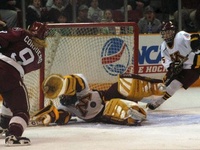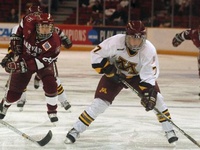
Minnesota hoists the NCAA championship trophy during the awards ceremony following its 6-2 victory over Harvard on Sunday.
PROVIDENCE, R.I.—Things fall apart.
For the first 40 minutes of the NCAA championship game, the nation's top two women's college hockey teams—No. 1 Minnesota and No. 2 Harvard—fought an evenly matched 2-2 contest that had all the markings of an epic battle to the end.
Then the Golden Gophers' first line—Natalie Darwitz, Krissy Wendell and Kelly Stephens—decided to take over the game. The three-pronged attack scored four unanswered goals in the final frame of action to put Minnesota (30-4-2, 19-3-2 WCHA) on top 6-2 and send the Crimson (30-4-1, 15-3-0 ECAC) home with a loss in the finals for the second year in a row.
The Golden Gophers' third period marked a total shift from the game's first two.
"We talked about 'this is our chance to reach our goals,'" said Minnesota coach Laura Halldorson. "And one of the things we talked about at the beginning of the year was to meet [President] George [Bush]—that was one of our goals. We’ve seen other teams go to the White House and we wanted to go."
In the final frame of the championship game, Darwitz struck first, starting Harvard’s demise just nine seconds into the third period.
She received a pass from Wendell off the opening faceoff and took the puck along the left side, out-skating Ruggiero to the faceoff circle, where she fired a shot at sophomore Ali Boe.
Darwitz skated in past co-captain Angela Ruggiero and knocked in the rebound past Boe’s right, but as soon as the officials signaled a goal, Boe and the rest of the Crimson turned in protest and the goal was put under review.
The controversy arose because an official blew his whistle prematurely and after Harvard's protests the officials called a timeout to review the play.
During the post-game press conference, Carolyn Campbell-McGovern, chair of the NCAA Women's Frozen Four Committee and the Senior Associate Director of the Ivy Group, issued a statement on behalf of the NCAA explaining the officials' ruling.
The referee ruled that the whistle had blown after the puck crossed the line and the goal stood—setting the record for quickest goal score in a period at nine seconds, breaking the old mark of 21 seconds set by Jennifer Botterill '02-'03 last year.
"Sometimes the game just goes your way and sometimes it doesn’t," Ruggiero said. "We kept our composure and were fighting."
Just 32 game seconds after Darwitz's goal—more than a few minutes had passed due to the officials' timeout—Stephens scored by deflecting a Wendell shot taken from the left faceoff circle past Boe's left.
With 19 minutes left, the Crimson had a chance to fight back into the game. But the two goals signaled a complete change in momentum that seemed to break the spirit of the skaters—especially Boe.
In the next few minutes immediately following the Gophers' fourth goal, the Crimson showed signs of life and gave the Harvard faithful reason to believe in a comeback.
Read more in News
Expository Writing














